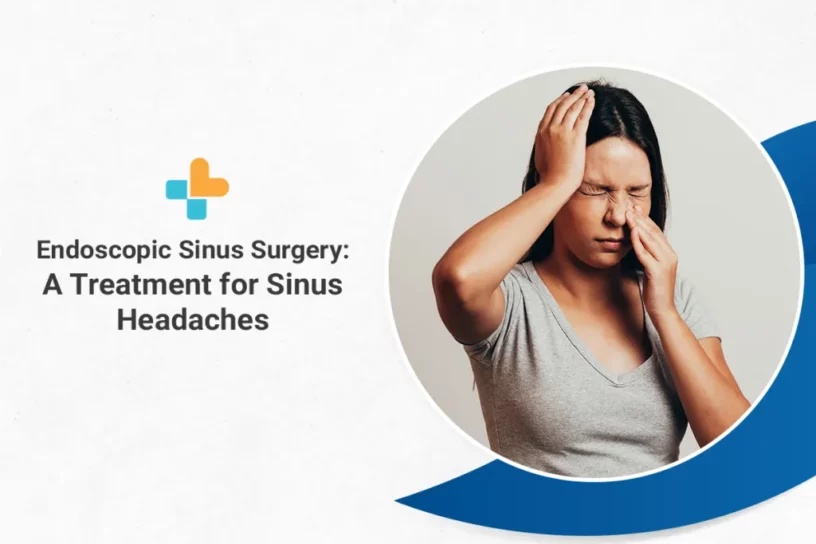Have you ever had a perfectly good day ruined due to a stuffy nose and a bad headache that affected your entire face, including your cheekbones, forehead and nose?
You might be experiencing a sinus headache.
These headaches can be triggered by the most minute things like dust clouds brought up by speeding vehicles or by the overpowering odour of your coworker’s new cologne/perfume.
So, how can you prevent this from happening over and over again? There are several treatment methods you can follow to help reduce these headaches. But, before we talk about treatments for sinus headaches, let’s understand what causes these headaches and who is at a higher risk of this condition?
How Do Sinus Headaches Develop?
Sinuses are a collection of empty spaces beneath your cheekbones, forehead, and nose. The mucus produced by these sinuses traps dust, pollutants and bacteria present in the air we breathe in.
In the scenario where an infection develops (sinusitis) in these sinuses, it causes inflammation or swelling of the tissue lining the sinuses, and you experience pain and pressure. This is how you get what is known as a ‘Sinus headache’. The causes of these sinus infections that lead to headaches are many and can happen to anyone. Some of these include ?
- Allergies – Pollen, dust mites, and pet dander are allergens that trigger the nose and sinuses to overreact. As a result, headaches, nasal stuffiness, sneezing, and itching occur.
- Common cold – The common cold, caused by a range of viruses, offers a perfect breeding ground for infections to develop in the sinuses. As a result, you develop throbbing headaches and thick mucus discharge.
*It is important to note that a common cold will not lead to a sinus headache by itself. The headache only arises when the sinuses get infected. So make sure you drain out and irrigate your sinuses when you have a common cold.
- Nasal polyps – They are soft, painless, non-cancerous growths on the lining of your nasal passages or sinuses. This growth often causes breathing problems and infections in the sinuses, which may lead to symptoms of headaches and facial pain.
- Deviated septum – When the wall that separates your nasal passages (septum) leans to one side, it is referred to as a deviated septum. This deviation causes a nasal blockage, which results in symptoms like headaches, nosebleeds and facial pain.
How Are Sinus Headaches Diagnosed?
Your healthcare advisor will start by asking a series of questions to develop a detailed medical history and find out about the symptoms of your sinus headache. A physical examination is done and if the symptoms described are severe and ongoing, imaging and MRI scans will be recommended to check for any serious underlying conditions. X Rays, CT scans and nasal endoscopy are also employed to check for sinus blockage.
Treatment for Sinus Headache
In most cases, sinus headaches are treated with over-the-counter medications. Antibiotics are commonly used to treat sinusitis, which is a common cause of sinus headaches. Nasal sprays or painkillers may be recommended if the headache is caused by inflammation or allergies. In rare cases, endoscopic sinus surgery is recommended to relieve the symptoms.
What is Endoscopic Sinus Surgery?
Endoscopic sinus surgery is often recommended for patients who have chronic sinus problems and have failed to respond to medications. The surgery is done to clear blockages in the sinuses. Headaches, nasal discharge, repeated infections, poor breathing, loss of smell and all other symptoms are relieved through this surgery.
The procedure does not require cutting into the skin but might take several hours to complete. Surgical instruments alongside an endoscope are inserted into the nasal cavity to observe and examine the sinus cavities. This helps the doctor to remove small bits of bone or other material that is obstructing the sinus passages, as well as mucous membrane growths like polyps. Lasers may also be used to burn away tissue that is blocking the sinus entrance.
The procedure can be done under general or local anaesthesia, with sedation provided by an anesthesiologist, so you won’t experience any pain or discomfort. You will be advised to fast for the entire night if general anaesthesia is administered. Your healthcare team will go over everything you need to do to ensure a successful surgery.
If you are suffering from severe headaches due to sinus infections or know someone who does, it’s advisable to get a consultation from an ENT specialist immediately. Book an appointment at Ayu Health ? Bangalore’s and Chandigarh’s most trusted network of high-quality hospitals. You can call us at +91 – 6366 100 800 or visit our website to find out more about our minimally invasive procedures employed to treat sinus headaches.
Also Read : 6 Simple Ways to Boost Your Immunity Naturally
Our Hospital Locations
General Surgery Hospitals in Chandigarh | General Surgery Hospitals in Bangalore | General Surgery Hospitals in Jaipur | General Surgery Hospitals in NCR | General Surgery Hospitals in Hyderabad
Our Doctors
General Surgery Doctors in Chandigarh | General Surgery Doctors in Bangalore | General Surgery Doctors in Jaipur | General Surgery Doctors in NCR | General Surgery Doctors in Hyderabad
About the Author

Dr. S. Goel
Dr. S. Goel is a renowned Internal Medicine Specialist currently practicing at Ayu Health, Bangalore. He is a Specialist in Internal Medicine, Diabetes HTN, Paediatric Care, and Family Medicine.




